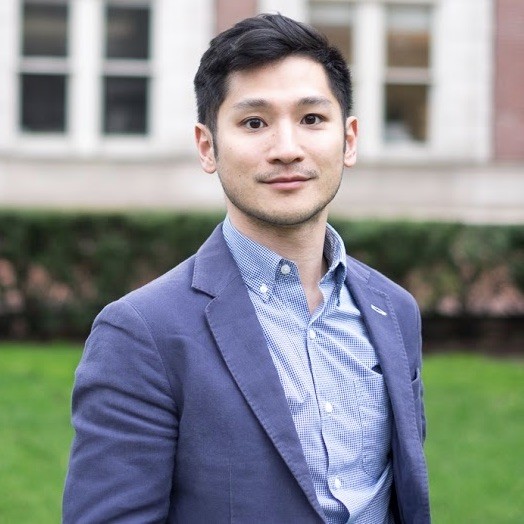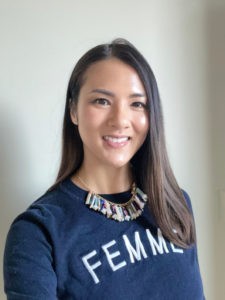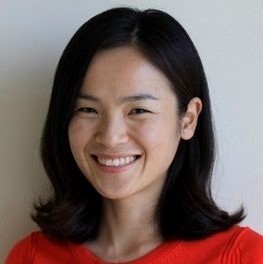WEAI Community Feature: Postdoctoral Scholars Yen Vu, Yuan Yi, and JM Chris Chang
The Weatherhead East Asian Institute is made up of a vibrant community of students, scholars, visitors, and others, brought together from across disciplines in the study of modern and contemporary East, Southeast, and Inner Asia. In this Community Feature, we are pleased to highlight three postdoctoral scholars—Jian-Ming Chris Chang, Yen Vu, and Yuan Yi—and the exciting work they are doing at WEAI.

Jian-Ming Chris Chang
1. Please introduce your name, academic/work background, and research interests.
My name is JM Chris Chang, and I'm a historian of Modern China. My research focuses on issues of social surveillance, bureaucratic culture, and paperwork in Maoist China, with a specific focus on the use of file systems and the policing of problematic political subjects and petty crime. I'm interested in the practical means by which bureaucracy produces and metabolizes massive quantities of information, as well as the disruptive effects that this kind of labor has on the political life and organizational capacity of the bureaucracy itself.
2. For the uninitiated, please explain what your position as a postdoctoral scholar at WEAI entails.
As the Asia in Action Fellow, I assist in coordinating public-facing workshops and programming. Much of this ongoing work falls under the umbrella of the public humanities, which is the basis of an initiative called Humanities in Practice which I run at the SoF/Heyman. Broadly speaking, the common focus of this work is an interest in applying humanities thinking and methods to issues of social concern, while seeking to make the scholarly work that we do more interdisciplinary, collaborative, and civically-engaged. WEAI's remote lecture series, "Knowledge and Inclusion in a Time of Fear and Ignorance", which addressed the spike of anti-Asian violence, is a great example of this approach, though this series predated my time in this position and I can take no credit for its achievements. We are continuing to think about ways in which we might better integrate Asia in Action with public humanities work around campus through programs for graduate training, coursework, and research collaborations.
3. What led you to this area of study and to the Weatherhead East Asian Institute?
Having previously received my doctorate from Columbia, I've spent quite a bit of time hanging around the Weatherhead these past few years. I'm sure I speak for many in saying that the greatest feature of the Weatherhead is its extraordinary community of researchers and scholars, from full-time faculty to international visiting scholars, who are all leading their respective fields in dynamic directions but come together at the Weatherhead as a common forum for the cross-disciplinary exchange of ideas. In my experience, WEAI has historically been among the best institutes on campus when it comes to supporting and empowering graduate students. It is a testament to WEAI that during my time as a graduate researcher, I received full support from WEAI to organize several workshops and conferences that were instrumental in my professional development.
4. What project(s) are you currently working on?
I'm currently working on a project centered on the system of personnel dossiers in Maoist China. The project approaches perennial questions of surveillance, bureaucratic dysfunction, and the political economy of information from the vantage of the dossier file, as a means of linking the frictions and anxieties of Maoist administration with the manual and material routines of managing paper files. The project brings together institutional history and microhistorical case studies of individuals that are drawn from individual dossiers, many of which I recovered in the course of my historical fieldwork as "grassroots" archival sources.
5. How has the pandemic impacted your research? Did your perspective about your area of study shift during this time?
I came back from a research trip to China just before the pandemic picked up steam in 2020 and haven't been back since. The coronavirus has obviously had disruptive effects on travel and research, as the situation in China these days is not very conducive to doing things online. That said, living with and through the pandemic has enabled all of us to refocus on important things closer to home--teaching, community, mental health to name a few--which I hope will lead to positive changes in the longer term. We had our first child at the height of the pandemic (fabulous timing), and while that experience came with its own intrinsic set of challenges, we were sustained in large part by the kindness and support of friends and colleagues. I love this job, and yet it is good to be reminded from time to time that there are things in the world that are more important than my research.
6. Are there any works or events by other members of the WEAI community that have inspired you, or which you would like to draw attention to?
All of my colleagues do great work, but I happen to be reading and enjoying Nick Bartlett's fantastic book, Recovering Histories: Life and Labor after Heroin in Reform-era China. I am so impressed with the way that the book is able to move between different registers of analysis so elegantly, while staying grounded in a rich, and sympathetic ethnography of long-term heroin users that Nick describes as a phenomenological account of recovery. I had a chance to read an early version of a chapter manuscript at the Modern Seminar a few years back, and so it's gratifying to see his efforts come to full fruition.
While I am not sure when this interview will be published, but I'll also plug a workshop series that I convened called "Remapping the Archive," which is currently ongoing. I am simply organizing so my role is minimal, but we have invited a lineup of outstanding China scholars to talk about current projects-in-progress, all of which represent dynamic new directions in which the China field is currently moving.

Yen Vu
1. Please introduce your name, academic/work background, and research interests.
I'm Yen, a California transplant living in New York. I completed my PhD at Cornell University in French Studies and have also taught at Hamilton College prior to coming to Columbia. My research straddles the fields of French and Vietnamese studies, intellectual history and literature. I'm interested in language and my current project examines the changing linguistic landscape of 20th century Vietnam as a lens to better understanding the social and political shifts of the era.
2. For the uninitiated, please explain what your position as a postdoctoral scholar at WEAI entails.
I get to spend a lot of time thinking about my work in different ways, including teaching a seminar directly related to my research called "Toward an intellectual history of modern Vietnam." This is one of the ways I'm working to establish this subdiscipline in the field of Vietnamese studies. I also taught a course called Film, Fiction and the Making of Modern Vietnams, which was a real treat, especially because it attracted students from all different kinds of majors and schools and made conversations fruitful and thought-provoking.
3. What led you to this area of study and to the Weatherhead East Asian Institute?
Trained predominantly in French studies, I came to my work through France's colonial history, notably in Vietnam. Because Vietnam is still very marginalized in French studies, it made me even more curious. On a number of serendipitous occasions, I also met Professor Lien-Hang Nguyen and she gave me the impression that the WEAI and Columbia's burgeoning Vietnam Studies program would be a great place to develop my research on Vietnamese intellectual history.
4. What project(s) are you currently working on?
My main manuscript looks at how Vietnamese intellectuals in the 20th century developed ideas of freedom through their exposure to foreign thought and languages. In this project, I examine language as form and content, the tongues we use as well as the discourses we circulate. In addition, I am also working on a second project that looks at the creative impetus in the diasporic community, a diasporic poetics, if you will. So far, I've written and presented on ecocriticism as one approach to such a poetics and expect this project to include writers as well as artists.
For fun, I host a podcast called Nam Phong Dialogues, named after a major journal of intellectual exchange in the 20th century. The idea is to bring scholarship to the Vietnamese community and make Vietnamese history accessible to a broader public. You can find it on Spotify, Apple Podcasts, Listen Notes, etc.
5. How has the pandemic impacted your research? Did your perspective about your area of study shift during this time?
This strange time made me question the value of my work and my role as a scholar in the various communities to which I belong. This led me to start the podcast project to broaden my research audience, because sharing my work was ultimately what was most important. The polarization of political platforms as well as the surfacing of underlying political and social issues in the US also made me feel more convicted about my work highlighting marginal voices and narratives, as well as the power of language and our deep attachment to different ideas of freedom as a society.
6. What resources have you found most useful at WEAI/Columbia/in New York? Or how has being a member of the WEAI community enriched your work?
Being a member of the WEAI and Columbia community in New York has strangely offered up so many interesting opportunities. The latest project I was involved in was being a language consultant for a short film shot in New York. I've had students from different institutions reach out to me for interviews about my work, and was also able to meet the ambassador of Vietnam over a casual lunch in February. All of these opportunities have broadened the definition of Vietnam Studies to me, which grants me a new way of seeing my role as a scholar in the community.

Yuan Yi
1. Please introduce your name, academic/work background, and research interests.
My name is Yuan Yi, and I am a Postdoctoral Research Scholar at the Weatherhead East Asian Institute at Columbia University and a 2021-22 Postdoctoral Fellow at the D. Kim Foundation for the History of Science and Technology in East Asia. I earned my PhD in Chinese history from Columbia University in 2020. With broad interests in Chinese history in global perspective, my research focuses on China’s industrialization and deindustrialization in the sector of textile production, the country’s primary industry from antiquity to the present.
2. For the uninitiated, please explain what your position as a postdoctoral scholar at WEAI entails.
This position entails research, teaching, and participation in the activities of WEAI. While primarily working on my book manuscript, I taught two seminar courses in Chinese history during the academic year of 2020-2021: “Made in China: Craft and Industry in Chinese History” and “A Transpacific Age: China-US Relations in the Long Nineteenth Century.” The former explored Chinese history through the lens of objects made by its people, with the goal of conveying the voices of historically underrepresented, often illiterate, groups of people such as artisans, peasants, women, and factory workers. The latter examined the history of China-US relations in the private sector beyond state-to-state diplomacy. I very much enjoyed working with students on their final projects and, inspired by their work, I am organizing a pedagogy workshop that addresses Chinese food and cooking as a critical teaching component in Chinese and Asian-American history classes in the pandemic era. This event will take place virtually on May 3 from 12:00-1:30 PM EDT.
3. What led you to this area of study and to the Weatherhead East Asian Institute?
I made a lengthy detour to be where I am. I wanted to be a marketing specialist when I was a freshman in business administration at Korea University, Seoul, South Korea. During the coursework, however, I paradoxically developed interests in things considered “non-profit,” such as cultural heritage, although now I know it is impossible to draw a straightforward line between the two sectors. After working for a relevant non-profit organization and taking one more degree, I realized that I was precisely interested in textile crafts and their histories, especially at the moment of industrialization in China and East Asia, part of which eventually became my dissertation topic at Columbia University. Through my research I have found and strive to find answers to questions regarding the relationships between craft and industrialization, human and machine, and labor and capital. WEAI, with its rich resources and vibrant interdisciplinary community, has been a wonderful place to pursue these inquiries.
4. What project(s) are you currently working on?
I am currently revising my dissertation for publication. My book project, "Industrial Craft: Machine, Labor, and Cotton in the Global Making of Chinese Factories, 1877-1937," examines the mechanization of Chinese cotton spinning with emphasis on the transpacific circulation of spinning technologies, cotton varieties, and technical experts. Drawing upon machine manuals, engineering journals, agricultural reports, and contracts between American machine firms and Chinese cotton mills, it shows how the Chinese addressed technological issues specific to American machines that failed to process short-staple Chinese cotton, through continued modification and repair of the foreign machines on the shop floor while replacing native cotton with fully acclimatized American varieties in cotton fields. A piece of this research will appear in Technology and Culture. I am also developing my second book project. A prequel to my current project, the new research will investigate how cotton had been cultivated and traded in China and beyond, before long-staple, white-colored American cotton began to be exclusively sought after for machine spinning. Additionally, I am preparing an article on the American chemical firm DuPont’s entry into China’s dye market in the 1920s.
5. How has the pandemic impacted your research? Did your perspective about your area of study shift during this time?
The pandemic has impacted my research on multiple different levels. The continued isolation, combined with increasing hostility toward foreign scholars conducting archival research in PRC, has forced me to explore alternative sources, including digitized collections, sources available in US archives and libraries, and non-archival, non-textual sources such as museum collections.
All these efforts have guided me to raise new research questions. The pandemic has also changed my view of the conventional, in-person conference. Online conferences, despite all their limitations, have allowed those who could not afford international conferences previously to be part of important intellectual activities in their fields. I think this is something we should consider seriously before going back to “the normal” and in the era of climate change. The in-person conference, which often entails international flight, is costly not only financially but also environmentally.
6. What resources have you found most useful at WEAI/Columbia/in New York? Or how has being a member of the WEAI community enriched your work?
Access to the invaluable library resources and online databases is one of the great privileges that I have enjoyed as a member of the Columbia community. Numerous interdisciplinary events that take place on a daily basis at WEAI and beyond have also enriched my work, often shedding unforeseen insights into my research.
